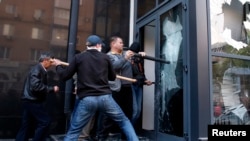Ukraine says it will continue pressing its military offensive against pro-Russia militants in eastern Ukraine, as U.S. Secretary of State John Kerry calls on Moscow to halt its support for the separatists.
Ukraine’s interior minister, Arsen Avakov, said troops had recaptured a television tower and government buildings from rebels in Kramatorsk, a town near the pro-Russian stronghold city of Slovyansk. In a Facebook posting Avakov said "we will not stop."
The move comes following deadly fighting between pro-Moscow and pro Kyiv forces in Ukraine southern port city of Odessa, which left at least 42 people dead and dozens injured.
In Moscow, Kremlin spokesman Dmitri Peskov said Russian President Vladimir Putin had not yet decided how to respond to the latest offensive or to the deaths in Odessa. Most of the victims were reportedly pro-Russia.
Separately, Peskov said that the Kremlin, within a 24-hour period, has received thousands of phone calls for help from people in Ukraine’s south-east allegedly asking for Moscow’s protection.
Russia currently has at least 40,000 troops and armor massed on its border with Ukraine, and the Kremlin has reserved the right to enter the country to protect ethnic Russians.
In Kyiv, meanwhile, the interim government declared two days of mourning for those killed Friday in Odessa.
Hours of street battles in the Black Sea port city ended in a deadly blaze at a trade union building, where outmatched separatists had holed themselves up seeking safety. It remains unclear who started the fire, but witnesses said gasoline bombs exploded around the building during the melee and that gunfire was heard.
Peskov is also quoted as saying Moscow has lost its influence with the separatists, saying it would be "impossible to persuade them to disarm amid a direct threat to their lives."
Kerry – traveling in Africa and speaking with his Russian counterpart Sergei Lavrov by phone on Saturday - said Russia must now withdraw its support for the separatists. Moscow says Lavrov countered by saying that Washington should compel the Kyiv authorities to stop their military offensive in the east.
Separately, Kerry welcomed the release of European monitors held for more than a week by separatists in Slovyansk.
U.N. Secretary-General Ban Ki-moon also welcomed the freeing of the seven observers with the OSCE - the Organization for Security and Cooperation in Europe. The monitors were freed Saturday, along with five Ukrainians. In a statement, Ban extended his appreciation to all who helped facilitate the release, including Russia.
And in Brussels, the European Union called for an independent investigation into the Odessa deaths. EU foreign policy chief Catherine Ashton said member-countries were "deeply saddened" by the deaths and injuries.
The current Ukrainian government and the West believe that the Kremlin is supporting separatists with the aim of destabilizing Ukraine ahead of presidential elections scheduled for May 25. Observers say the vote could hasten and solidify Ukraine’s move toward the West – a development, they believe, Russia is trying to forestall. Moscow denies that it is fueling unrest and blames the turmoil on Kyiv and what it calls its Western backers, primarily the U.S.
Ukraine’s interior minister, Arsen Avakov, said troops had recaptured a television tower and government buildings from rebels in Kramatorsk, a town near the pro-Russian stronghold city of Slovyansk. In a Facebook posting Avakov said "we will not stop."
The move comes following deadly fighting between pro-Moscow and pro Kyiv forces in Ukraine southern port city of Odessa, which left at least 42 people dead and dozens injured.
In Moscow, Kremlin spokesman Dmitri Peskov said Russian President Vladimir Putin had not yet decided how to respond to the latest offensive or to the deaths in Odessa. Most of the victims were reportedly pro-Russia.
Separately, Peskov said that the Kremlin, within a 24-hour period, has received thousands of phone calls for help from people in Ukraine’s south-east allegedly asking for Moscow’s protection.
Russia currently has at least 40,000 troops and armor massed on its border with Ukraine, and the Kremlin has reserved the right to enter the country to protect ethnic Russians.
In Kyiv, meanwhile, the interim government declared two days of mourning for those killed Friday in Odessa.
Hours of street battles in the Black Sea port city ended in a deadly blaze at a trade union building, where outmatched separatists had holed themselves up seeking safety. It remains unclear who started the fire, but witnesses said gasoline bombs exploded around the building during the melee and that gunfire was heard.
Peskov is also quoted as saying Moscow has lost its influence with the separatists, saying it would be "impossible to persuade them to disarm amid a direct threat to their lives."
Kerry – traveling in Africa and speaking with his Russian counterpart Sergei Lavrov by phone on Saturday - said Russia must now withdraw its support for the separatists. Moscow says Lavrov countered by saying that Washington should compel the Kyiv authorities to stop their military offensive in the east.
Separately, Kerry welcomed the release of European monitors held for more than a week by separatists in Slovyansk.
U.N. Secretary-General Ban Ki-moon also welcomed the freeing of the seven observers with the OSCE - the Organization for Security and Cooperation in Europe. The monitors were freed Saturday, along with five Ukrainians. In a statement, Ban extended his appreciation to all who helped facilitate the release, including Russia.
And in Brussels, the European Union called for an independent investigation into the Odessa deaths. EU foreign policy chief Catherine Ashton said member-countries were "deeply saddened" by the deaths and injuries.
The current Ukrainian government and the West believe that the Kremlin is supporting separatists with the aim of destabilizing Ukraine ahead of presidential elections scheduled for May 25. Observers say the vote could hasten and solidify Ukraine’s move toward the West – a development, they believe, Russia is trying to forestall. Moscow denies that it is fueling unrest and blames the turmoil on Kyiv and what it calls its Western backers, primarily the U.S.





